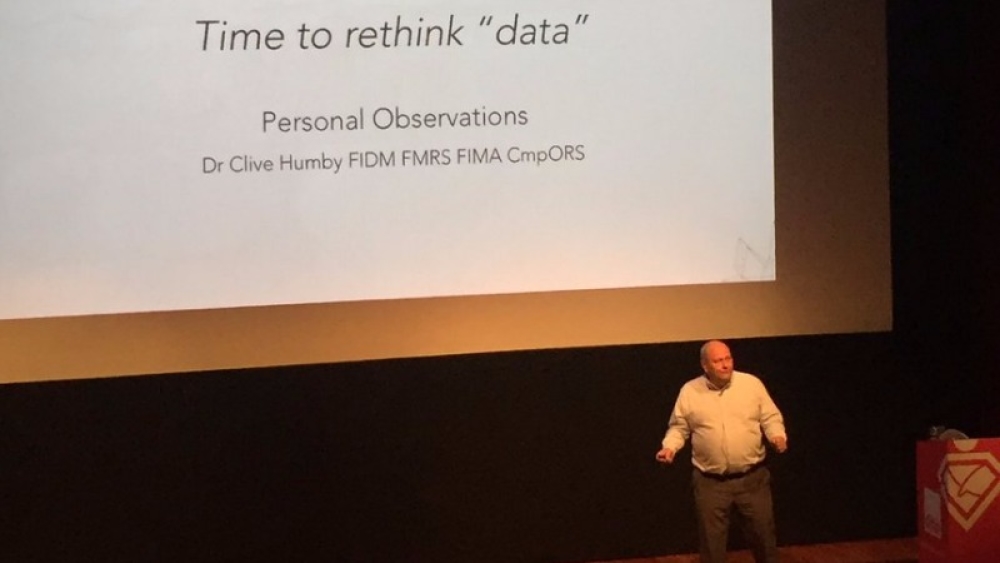Customer Engagement 2017: Clive Humby and the loyalty myth
05 Jul 2017

Dunnhumby and Starcount founder, the father of Big Data Clive Humby, warns against the Loyalty Myth - not all companies have rich enough data to really understand their customers
Clive Humby kickstarted the data revolution thanks to his work with Dunnhumby for Tesco in the 1990s. His business then was limited to data from transactions, but vast quantities of it. What can marketers expect from today's Big Data revolution?
"Chatbots, AI - all these ways of engaging with customers means we have to rethink what we mean by data," he says.
"With Tesco we could use data as a weapon. This was possible because of the richness of the data. It was immense. Those things tell a story. For most other businesses that isn’t true.
"The blunt answer for most businesses who want to ‘do a Tesco’. is that you can’t," he says. "You can’t understand your customer well enough from transaction data."
He says there is a big data myth, perpetuated by the belief that data holds all the answers.
"Businesses fail to understand. They think their own data tell them everything about their customers. It doesn’t," he says.
He goes on to paint a picture of evolving data targeting:
- 1955: TV spots bought AB, C1, C2, DE - you are the job you do
- 1980: Geodemo, graphics, ACORN, MOSAIC - you are where you live
- 1990: Lifestyle lists: NDL, Guarantee cards - you are what you say
To this point, all data is claimed and demographic. "It’s the persona I project to you. It’s not real," he says.
- 1997: Customer data: TESCO, Amex, Visa, Amazon - you are what you buy
-
2010: Big Data - social media, digital media, mobile, browsing behaviour. You are what you are passionate about
This is, he says, is, "Actual and behavioural data. But most companies do not have the information they need."
He says the cost of storage has plummeted. 1 tetrabyte of storage would have cost millions 20 years ago. Today, "I could store everything about your life for 1 terabyte of storage, which costs about $30. Usually, we give our data away readily because we get stuff for free."
Five considerations for marketers:
The Loyalty model
"The Original loyalty model needs a major rethink.
"If I give you 1% for loyalty, but next week you get 40% off - how is that loyalty? Offers are often trying to fix business problems. Decisions are not often right for the customer, but right for the business. Few business actually do what's right for the customer."
Transactional data
"Most of us don’t know our customer through our own data.
"You know where they live, but you don’t know much about their family etc.
"Supermarket data revealed a lot about this, but most transatcional data doesn't."
Push marketing no longer works
"Adblocking etc. means that push marketing online is no longer viable," he says.
Open data
"Open data, the Internet of Things rewrite the rule book, smart buttons etc."
Promotions
He says even transactional data may be compromised because of the high proportion of promotions on offer at any time. "We are dependent on ‘promotions’ because it’s a way to be relevant to a lot of people at one time. 40% of high street sales are ‘on promotion’, or the cheapest ticket on price comparison sites."
"The key themes today are convenience, trust, endorsememnt, and My Tribe. We need to explore all of these," he says.
"At Tesco, we decided that 'you are what you buy'. This tells a real story about your family and what drives purchase decisions. Great for a supermarket, not so good for fashion, leisure, luxury.
"So how do you understand the customer?" he asks.
The Loyalty Myth
"Your loyalty scheme is probably a card or an app, giving maybe 0.5% to 4% return," he says.
"How valuable is transactional data if such a huge proportion of items are sold ‘on promotion’?
"So why do it? We don’t know the context.
"Another issue - is the boom in ways of talking to customers which means we will develop digital ghettoes in our data. Some will talk on messenger and buy several times. Most will just buy once and that will be your only contact.
"Companies are building a digital ghetto inside their business," he says.
"These customers are the ones bombarded with messages but it’s not generating returns. Why? Why focus on these customers rather than the long tail of people who are not online but may shop with you regularly?"
He says businesses often record purchases but not whether the purchase was on discount, and this absence confounds the data.
"You get what you measure. This customer likes these things but they were on promotion. People [marketers] don’t like admitting that people buy on promotion. Often businesses don’t record these discounts."
Functional loyalty
"We want real loyalty - the kind of person who gets a brand tattooed on their arm. That is real loyalty.
"Unless we can get people to feel some degree of that, then we sell on price, convenience and perhaps that they trust us.
"Apple has people queuing down the street to buy. That’s loyalty," he says.
What do you need to understand?
"If you have data on transactions, this does not translate backwards through behaviour, drivers of behaviour or attitudes. You need all this information to get the benefit."
"New open data sources like IoT, Social or Smartphone data. Do you have a smart TV? That generates data on you every day. Your car generates data - do you stick to the speed limit? Do you always take the same route?
"These are new sources of data you need to build into your thought processes. Importantly, this data tracks what people actually do, not what they claim to do.
"One example from Tesco - millions said they would donate points to charity. Actually, very few actually did," he says.
What does Big Data mean?
There are new models of customer value he says.
"Who is more loyal," he asks, "An older person who spends regularly but often, or a more wealthy person who may spend more overall but is also more promiscuous?
"The answer is the old lady. At the moment we reward the checque book. That’s not loyalty."
He says customers are taking control of their data and it will be possible to bring your Tesco data to Sainsbury’s, or use apps with personal data lockers.
"There is a new revolution coming. Not a gradual one, but a major one. The key question shoudl be - is it cool or is it creepy?.
"Data has to be in the boardroom. We need to get rid of the obsession with the known customer. We sell to individuals but we understand audiences. Real understanding comes from outside the organisation, not from within.
"To anticipate customer demand, this will not come from transactional history.
"Also, we only measure success. Nobody reports on the customer who is annoyed and unsubscribes or stops buying. How many of your top 10 customers last year are still top 10 customers this year? Are you brave enough to take that to the boardroom?
"Walled gardens [Facebook, Google, etc] are a much bigger issue than the GDPR. Most creepy stuff is within the walled gardens.
"It’s incumbent on us to say to them, 'Your behaviour is not acceptable'. Should we become active social disruptors by putting noise into the system?
"How will I engage with people to know more about them? Do I do it myself or do I deal with these massive data companies?" he asks.

Please login to comment.
Comments